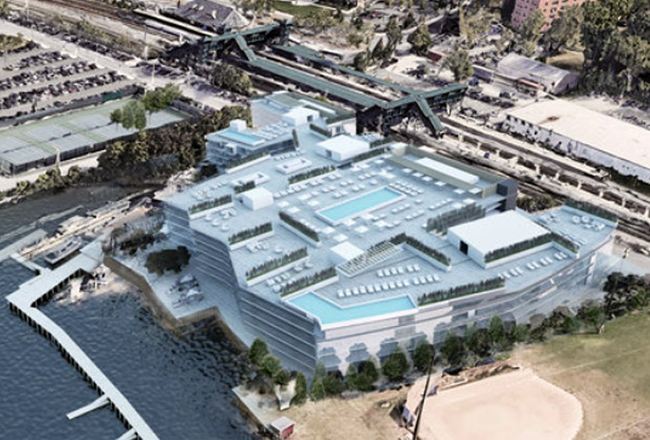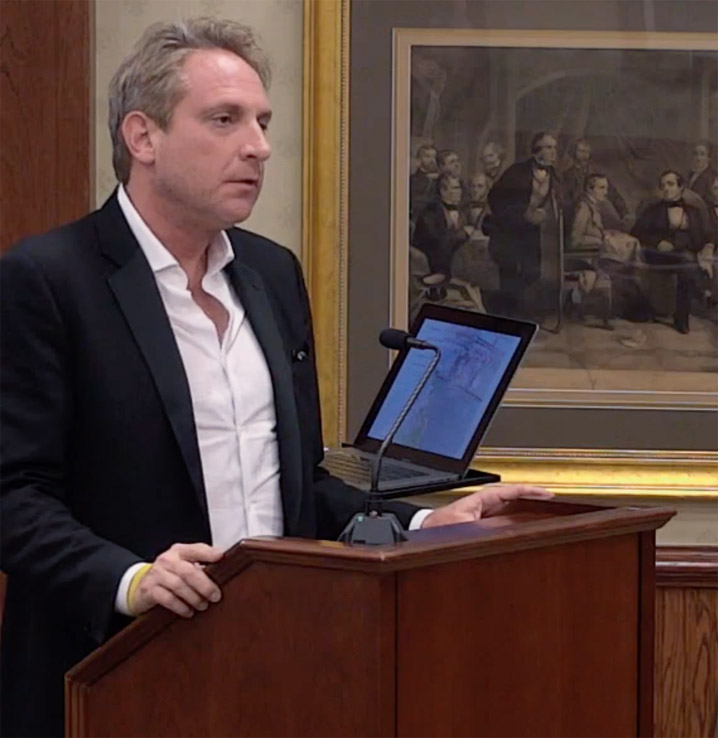Developer proposes 168-room hotel, apartments, modern marina for Tarrytown
A proposal to bring a hotel, apartments and restaurants to the Tarrytown waterfront, as well as rejuvenate the marina, is being discussed for possible formal submission to the village’s board of trustees and planning board.
The developer is YZK Development Group, a joint venture bringing together Michael Yanko of The Yanko Group in New York City, architect Carlos Zapata, principal of the Carlos Zapata Studio, and Melissa Koff, managing partner of the architectural design firm.
The developer made a conceptual presentation to the planning board.

The village has been preparing a proposal for new zoning in the area of the Metro-North Railroad station and Hudson River waterfront. YZK Development said its proposal would fit well with what the Station Area Overlay District (SAO) likely would allow.
The development would encompass four parcels on the west side of the train tracks fronting on the Hudson. The northernmost piece of land is owned by the village of Tarrytown. Next along the river is the parcel housing the Tarrytown Boat & Yacht Club. Adjacent to it is a commuter parking lot used by about 170 cars, also owned by the village. The fourth parcel is the boat club’s marina. The sale of the boat club’s properties to the developer was scheduled to be completed no later than Dec. 17, according to Lou Monaco, the boat club’s commodore.
“This project is precisely what the SAO is encouraging. We wanted to share with you our concept and let you give us feedback or raise questions,” attorney David Steinmetz of the White Plains-based law firm Zarin & Steinmetz told the planning board on Nov. 25.
Monaco told the board, “We are excited about this. It keeps our club active and ongoing. We think if something like this can happen it would be fantastic for the riverfront and for our boat club.”
Monaco said under the contract, the developer has to provide a certain number of slips in the marina but does not obligate them to dredge it.
“If they want a viable marina there they’re going to have to dredge and rebuild the seawall,” he said. “Right now we could accommodate boats up to 30, 35 feet. If you want the bigger boats, you’re going to have to dredge.”
Monaco said the last time the marina was dredged was in 1988.
The developer’s preliminary plans call for two major structures. The northern building would contain 52 residence units on five floors and would total 77,897 square feet. The southern building would be the hotel and a parking garage. The hotel also would be five stories and would have a total of 168 rooms with 32 of them suites. The gross area would be 151,168 square feet. The seven-floor garage would have space for 607 cars and would encompass 192,982 square feet.
The residential building and the hotel would each have restaurants. There would be 575 square feet of retail space in the residence building. The hotel would have 7,543 square feet of event space, a gym, spa, meeting rooms, bars and a library.
Another feature of the hotel would be found within the marina. There would be some river suites, pod-like structures supported by pilings. Standalone pods are currently being added as rooms at a few hotels and resorts overseas.
“The technology is proven technology,” Zapata said. “We’re taking the concept of a hotel and matching it with the needs of the river, so we have river suites.”

“The river suites are going to be green, full-force sustainability, up and down by the tide, rotating by the sun,” Yanko said. “One or two of them are going to become conference rooms, or a little party room where the certificate of occupancy permits the use. The sizes of these suites are going to be between 500 and 1,000 square feet.”
Yanko said the river suite pods could be a great attraction for people visiting in their boats who don’t want to sleep on the boat. He said international hotel chain Radisson loved the idea of the river suites as well as the proximity to the Mario M. Cuomo Bridge.
“We owe it to the residents to have the ability to come down to the river and we also owe it to ourselves to preserve the boat club, the Tarrytown Boat Club, and reinstate the marina and bring it back to its glory, what it used to be when it was a 180-slot marina with bigger boats and a lot happening,” Yanko said.
Yanko’s background includes developing approximately 1.5 million square feet of residential and hospitality properties. The Yanko Group’s portfolio includes The Whitman Building in Manhattan’s Flatiron District, and the 373-room Pod 39 hotel and 222-room Ink 48 hotel, also in Manhattan.
Zapata’s projects include a new international concourse at Miami International Airport, the modernization of Soldier Field stadium in Chicago and the Bitexco Financial Tower in Ho Chi Minh City, Vietnam.
Zapata said the modern style of the proposed buildings was chosen to fit with the modern style of the new bridge. He also said that he would like to use ground source heat pumps and evaporative cooling for the buildings.
“I think this is beautifully positioned to take advantage of the fact that there is a train station with overpasses on it that will allow people to cross the tracks and be at the front step of our project and be received by the hotel and be received by a pedestrian access to the river,” Zapata said.
Steinmetz explained that for the development to work, the village would have to be willing to either sell or lease to the developer the northern parcel and parking lot adjacent to the boat club. He said the developer would provide alternative parking on the east side of the train tracks.
“The concept would be to construct a structure that would accommodate at least 170 vehicles,” he said. “That’s the number of vehicles that currently park on the south lot on the west side of the tracks. Our concept would be to see that parking structure erected with some kind of ground-floor cafe, some kind of rooftop amenity that people will enjoy.”
Steinmetz estimated the project could easily generate from $700,000 to $1 million a year in property taxes for the village while creating substantial numbers of construction jobs and permanent jobs. No date was given as to when a formal application for the project might be filed.